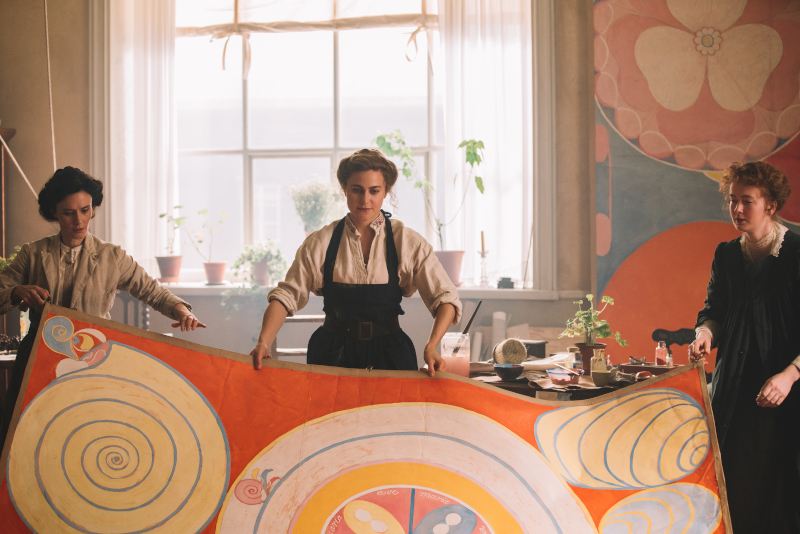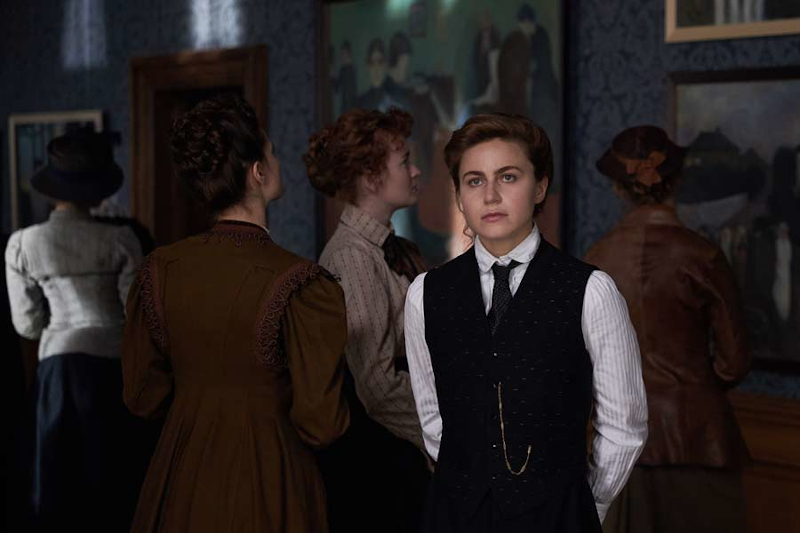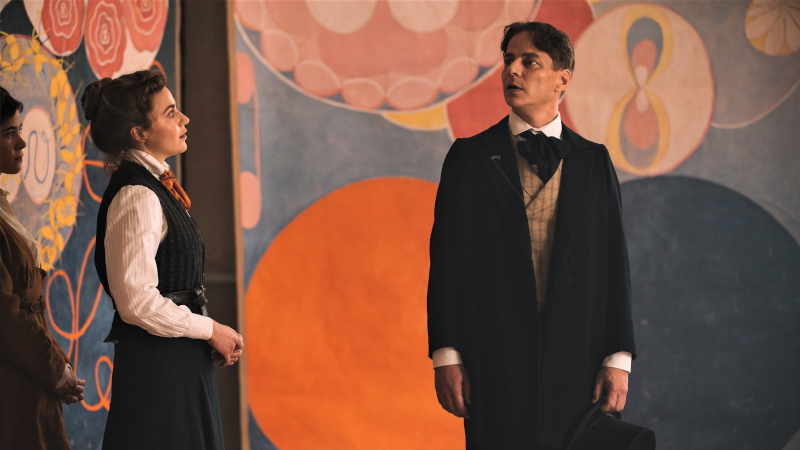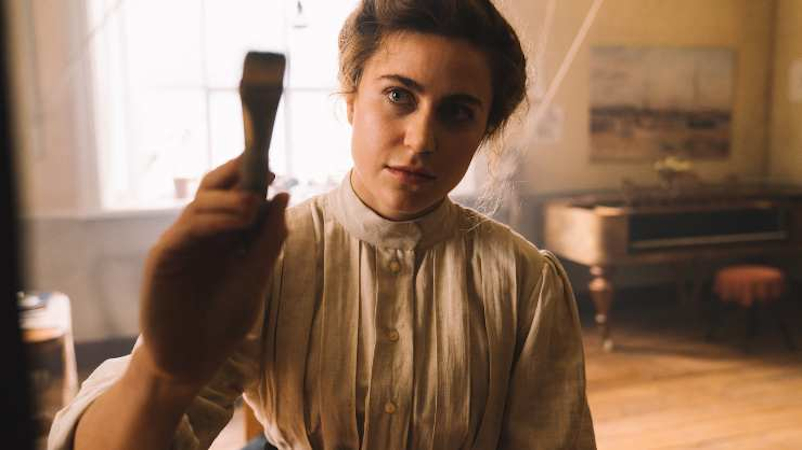Director – Lasse Hallström – 2022 – Sweden – Cert. 12a – 119m
****
Late in her life, Swedish artist Hilma af Klint, today considered the world’s first abstract painter, remembers her life – out in UK cinemas on Friday, October 28th
As Swedish artist Hilma af Klint (Lena Olin) takes a tram journey, she remembers key events and moments within it: she is haunted by the memory of her little sister Hermina (Emmi Tjernström), who tragically died when Hilma (Tora Hallström) was 18 and with whom she often played hide and seek.
Interested in drawing and painting from nature as a form of scientific inquiry – at her art school interview panel she lists mathematics, geometry, biology and astronomy as interests other than flowers – she meets up with other women studying technical painting and drawing in Stockholm, among them the wealthy Anna Cassel (Catherine Chalk) who becomes her lover and finances her as an artist – and becomes part of their group of five women artists interested in spiritism. She also studies the Theosophical writings of Madame Blavatsky and makes a particular connection to the Anthroposophist ideas of Rudolf Steiner.

Acknowledging these interests, the film infuriatingly refuses to explore them at any great depth, perhaps because it fears such ideas might prove controversial and perhaps because they might prove boring to a contemporary audience, it’s impossible to tell. Instead, it focuses on Hilma’s work as an artist, who while she outwardly painted landscapes and natural history en plein air believed herself commissioned by spirits to design a temple for all faiths and none featuring copious amounts of visual art paint including maps of the spiritual world in the form of giant canvases painted under spirit guidance. She ropes the other members of the Five into this, but in the end none of them quite grasp her vision.
On the verge of exhibiting these paintings, she discovers Steiner (Tom Wlaschiha) is to visit Stockholm and invites him to view the work, but his disparaging reaction causes her to cancel the paintings’ appearance in an upcoming exhibition. Later, she paints small abstracts, many in watercolour, guided she says by her own hand rather than spirits, but when she visits Steiner in Switzerland he rejects those too. She eventually falls out with Anna, who stops funding her.

If the piece will only go so far in exploring the ideas behind Hilma’s paintings, it leans instead to viewing her as a woman battling patriarchy in a narrative that doesn’t give men much of a look-in. (I’m not objecting to that, merely stating it to be a fact of the narrative here.) Fellow students are stuffily sexist, telling her to go to the women’s entrance round the back, Edvard Munch (Paulius Markevicius) is little more than a figure in the background while Wassily Kandinsky – championed as the first non-figurative artist – is presented by an exhibition of his paintings into which Hilma stumbles and becomes deeply upset since she arguably got there first without the acclaim.
It is, however, prepared to show much of the visual side of Hilma’s work, and delivers a couple of terrific if brief drawn animation sequences by Benny Box and the team bringing that work to life. The second of these, towards the end, feels like a rerun of the slit-scan sequence (the light show) at the end of 2001 (Stanley Kubrick, effects: Douglas Trumbull, 1968) and the film even throws in live action shots looking downward on a spiral staircase shaft and upward at the spiral of the gallery of the Guggenheim for comparison with Hilma’s imagery.

The film may be at its strongest when dealing with bereavement, with the vivaciousness of the younger sister making an impression in the first ten minutes and her absence hanging over the rest of the film and providing weight to Hilma’s falling in so readily with spiritism and its aim of contacting and learning from the dead. The idea of a weight being dropped from a ship to determine the exact depth of the ocean at a given place proves to be a recurring motif, with Hilma’s artistic imagery sometimes appearing on the ocean floor where the weight touches it, a metaphor for the exploring of the unknown and seeing how far you can go.
Tora Hallström (real life daughter of director Hallström and star-billed actress Lena Olin) carries the film and is surprisingly good in it; this casting works too, because after seeing Olin as the artist later in life, you immediately recognise the younger actress as her character’s younger self (something which has to work if the film as a whole is going to work). Equally striking is Catherine Chalk as her lover Anna. The film delivers enough romance between the pair of them that you know what’s going on – just enough to earn the film a 12a – but never falls in to the trap of flesh or nudity for its own or exploitation’s sake. That said, I didn’t find its portrayal of portrayal of an artist’s relationships as deep or as compelling as that of Tove (Zelda Bergroth, 2020).
The production values are solid (the trams are particularly impressive) and the whole thing is engaging enough to succeed in its modest aims. It’s worth seeing, but don’t expect to be challenged too much by it.
Hilma is out in cinemas in the UK on Friday, October 28th.
Trailer:
